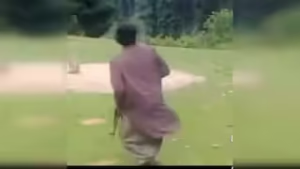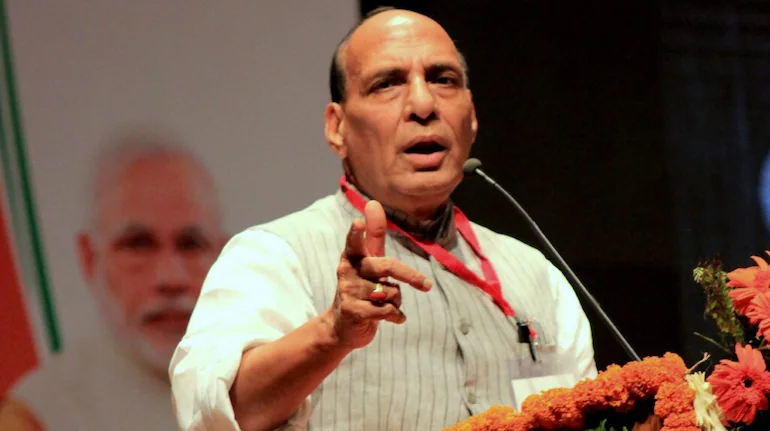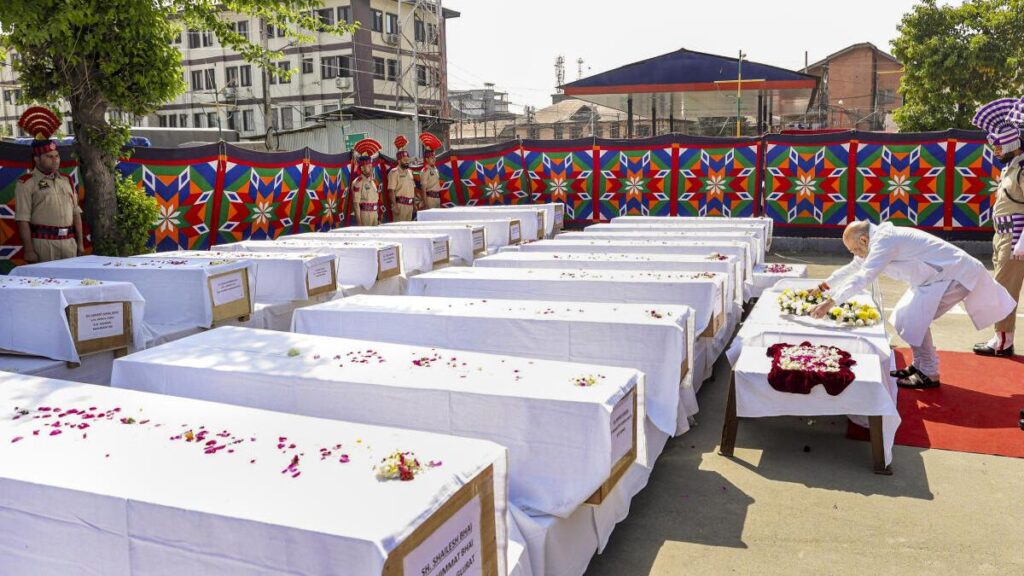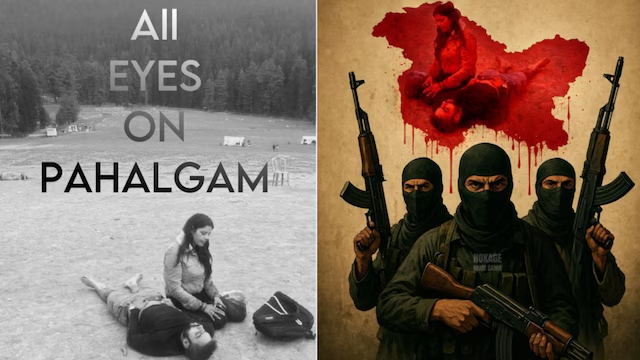Pahalgam, Jammu and Kashmir | April 20, 2025 | 4:30 PM IST — The peaceful Baisaran meadow, a tourist hotspot known for its scenic charm, turned into a war zone as terrorists dressed in Army-style fatigues launched a brutal attack on innocent civilians. The Pahalgam terror attack is now being called the most deadly assault on civilians in India since the 26/11 Mumbai attacks. The incident has deeply shaken the nation.
A Serene Day Turns into a Nightmare

What was supposed to be a day of relaxation and sightseeing ended in bloodshed. As tourists enjoyed horse rides and picnics on the grassy slopes of Baisa———–ran meadow, a group of heavily armed terrorists suddenly emerged from the tree line. They were wearing camouflage uniforms, identical to Indian Army attire. This gave them an advantage, as civilians initially mistook them for soldiers ensuring safety.
Without warning, the terrorists opened fire indiscriminately. In just a few terrifying minutes, 26 people were killed. The victims included men, women, and children. Another 32 sustained injuries, many of them critical.
This horrifying event, now widely known as the Pahalgam terror attack, has been condemned across the globe.
Eyewitness Accounts: Panic and Pleas for Life
Survivors are still in shock. Many spoke of the confusion when the attackers appeared. “We thought the Army had come to ensure our safety,” said one injured survivor. “But then the firing began. People started running. Some screamed, others just froze.”
In one particularly harrowing moment, a group of children mistook the camouflaged attackers for real soldiers and ran toward them for help—only for the attackers to open fire. One father broke down as he recounted how the attackers shot his young son while the boy tried to hide under a horse.
After the shooting stopped, it was the Army—this time the real one—that arrived to secure the area. However, the psychological impact had already taken its toll. Survivors couldn’t differentiate between real soldiers and attackers, and some began sobbing uncontrollably at the sight of the rescue team.
Immediate Government Response: Modi Returns to Delhi

Upon learning of the Pahalgam terror attack, Prime Minister Narendra Modi immediately returned to Delhi, cutting short a public event. He chaired an emergency meeting with top officials from the Home Ministry, the National Security Advisor’s office, and intelligence agencies.
In a public address, PM Modi stated, “This is not merely an attack on individuals, but an assault on the very soul of India. The culprits will face justice. We will not rest until it is served.”
Military-Grade Weapons and Advanced Planning
Preliminary forensic analysis and survivor testimonies point to the high level of planning that went into the Pahalgam terror attack. The attackers were not amateurs. The attackers carried military-grade rifles, wore body armor, and used sophisticated communication devices.
Investigators revealed that the terrorists used encrypted radios to coordinate their movement. The bullets recovered from the scene match those used by special forces, indicating foreign support or smuggling. Intelligence reports suggest that the assailants may have received training in a neighboring country, raising serious concerns about cross-border involvement.
This wasn’t a random shooting. It was a meticulously planned terror strike designed to inflict maximum civilian casualties and provoke fear.
Pakistani Provocation: Coincidence or Conspiracy?
The Pahalgam terror attack came just three days after a highly provocative speech by Pakistan’s Army Chief, who reiterated support for Kashmir’s “freedom.” While officials haven’t confirmed a direct link, the timing raises significant suspicion.
Intelligence agencies are examining whether the speech served as a green light for the attack. India’s Ministry of External Affairs has summoned Pakistani diplomats and issued a strong warning. The government is also preparing a dossier to present at international forums, including the United Nations and the Financial Action Task Force (FATF).
Rajnath Singh’s Stern Warning

Defence Minister Rajnath Singh condemned the attack in the strongest terms, vowing to hold not just the attackers, but their handlers and planners accountable.
“To those behind the scenes in the Pahalgam terror attack, we will get you,” he declared. “We won’t just go after the foot soldiers. We will expose and eliminate the entire network, wherever it exists.”
His statement underscores the government’s intent to expand its response beyond borders if necessary.
Psychological Toll on Survivors and Children
While hospitals treat gunshot wounds and physical injuries, a deeper trauma has begun to surface—especially among children. Mental health experts are reporting signs of acute psychological distress among the survivors.
A young girl who witnessed her mother’s death now refuses to speak. Another child wakes up screaming from nightmares. Psychologists warn that the impact of the Pahalgam terror attack could lead to long-term mental health issues if not addressed immediately.
Local NGOs and mental health professionals have urged the government to launch a specialized trauma care program in the region.
Security Review and Tourist Safety Concerns
Following the attack, authorities have tightened security across all major tourist destinations in Jammu and Kashmir. The Army and CRPF have launched a joint search operation in South Kashmir and have detained dozens of suspects for questioning.
Tourism in the Valley—a lifeline for thousands—has been severely affected. The Baisaran meadow shooting has raised serious concerns about the safety of civilians in conflict zones. Officials have now proposed deploying quick-reaction teams and increasing drone surveillance in all high-footfall areas.
Nationwide Outrage and Mourning

As news of the Pahalgam terror attack spread, the entire nation reacted with grief and anger. Candlelight vigils were held in Delhi, Mumbai, Bengaluru, and Srinagar. Political leaders across party lines expressed solidarity with the victims.
Social media platforms were flooded with messages of support under hashtags like #PahalgamAttack, #StandWithKashmir, and #JusticeForVictims.
Even international leaders, including UN officials and foreign diplomats, condemned the attack and extended their condolences to the families of the victims.
Call for Global Action Against Terrorism
India is now intensifying its diplomatic campaign to urge the global community to act against nations that support terrorism. The government plans to present detailed evidence to the UN and push for further sanctions against organizations and countries that harbor terrorists.
The Pahalgam terror attack has reignited the debate on global counterterrorism cooperation and exposed the vulnerabilities of even the most peaceful civilian zones.
Conclusion: A Tragedy That Must Not Be Forgotten
The Pahalgam terror attack is more than just another incident in Kashmir’s long history of violence. It is a chilling reminder that terrorism continues to evolve and adapt, exploiting every possible loophole to strike at the innocent.
The attack claimed twenty-six lives that fateful day and left many more permanently scarred. As India mourns, it also prepares to act—with resolve, with unity, and with the firm belief that justice will prevail.
We must remember their names. We must remember their stories. And most importantly, we must ensure that the Pahalgam terror attack becomes a turning point in the fight against terrorism. For More News Visit Funtourstation.com


